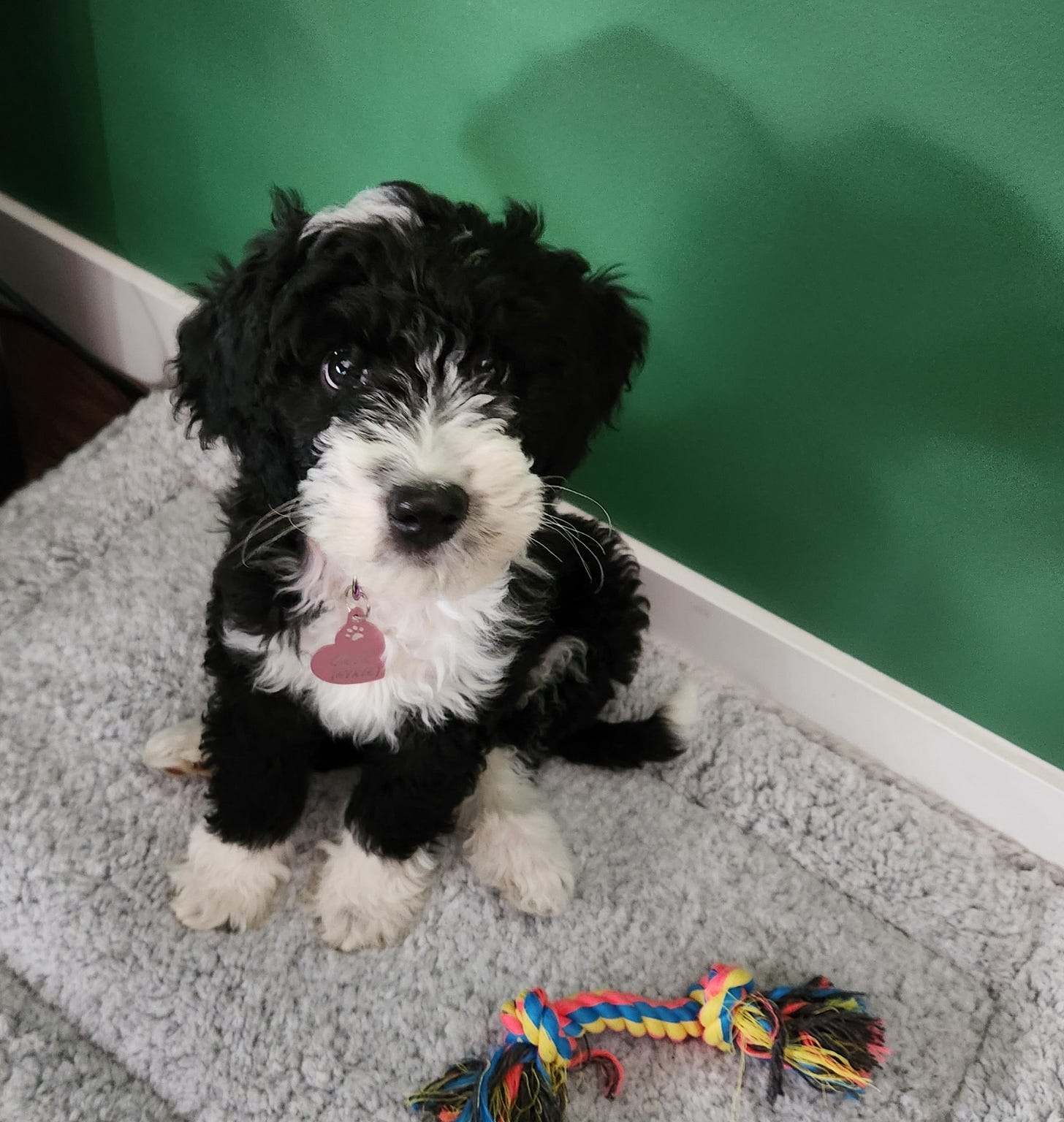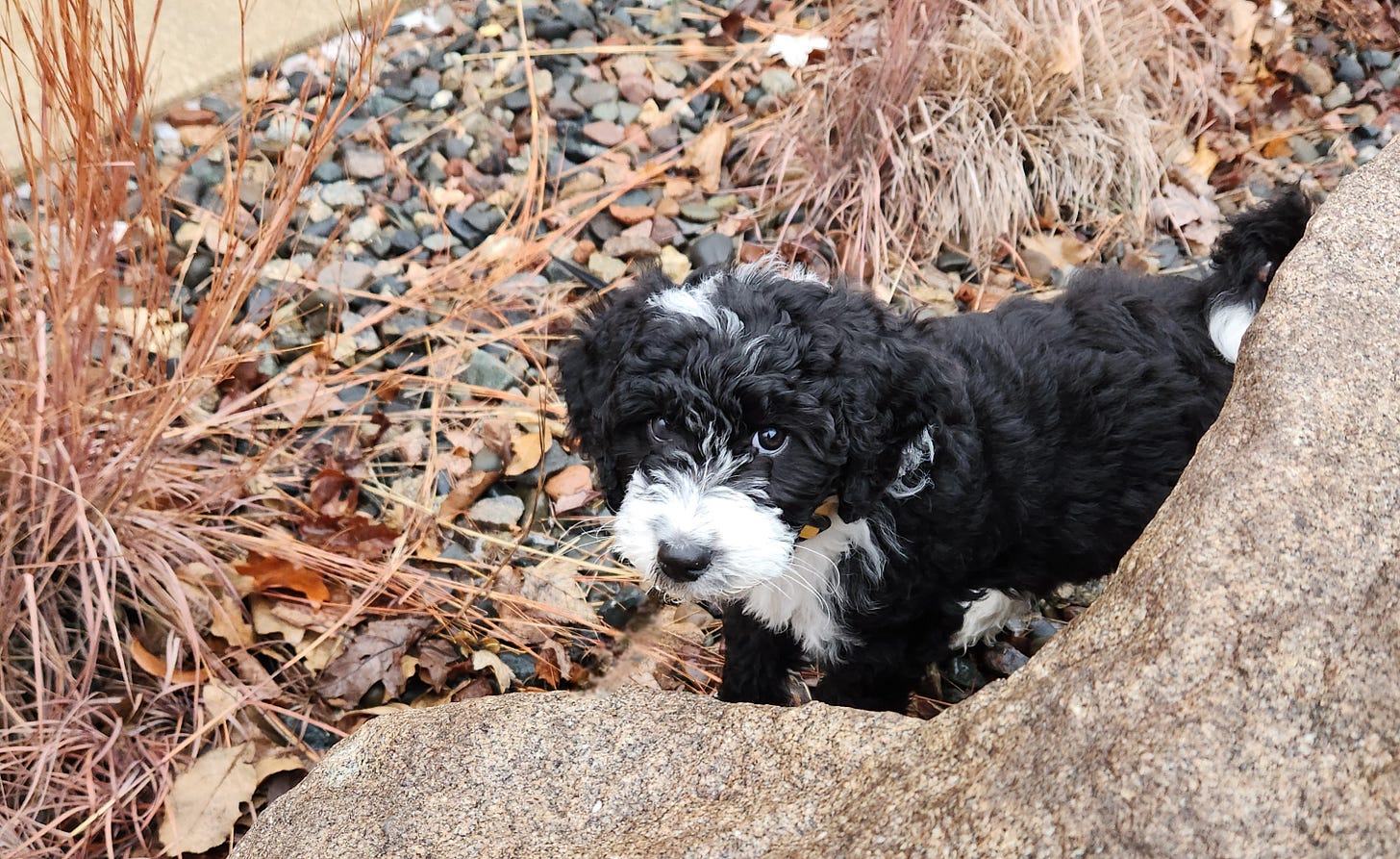After an 18-month dogless interlude, we brought a puppy home last Friday. She’s a “golden mountain doodle”—mostly poodle, a little golden retriever and some Bernese mountain dog. We like to name our dogs (all two of them so far) after rocks and minerals.1 When I discovered that onyx is both black and white—I had previously thought it was only black—Onyx it was.

I like dogs. I always have. The ones I’ve known have been friendly and affectionate. But I’ve often marveled at the fact that when you have a dog or cat, you’re living with an animal in the house.2 Granted, a dog or cat is not a wild animal. They have lived with humans for evolutionarily significant amounts of time. They’re animals nevertheless, and therefore necessarily Other, no matter the bond we might have with them. They have different senses and interests, inhabit a different Umwelt—the German couldn’t be a more perfect word here. I suppose a literal translation of it would be “around-world;” it means environment. Animals may share our spaces, but they don’t entirely share our world. (I’m reminded here of philosopher Ludwig Wittgenstein’s claim that if a lion could talk, we wouldn’t understand him.)
I assume that it’s because of this Otherness that I have these occasional moments of wonder at the fact that I live with a non-human animal. That, and probably also the fact that you can’t get close to wild animals but you can get close to domestic ones, touch them, feel their warmth and texture. A pet is in this sense more real to me than a wild animal is. (Which is probably not a coincidence, given the meaning of touch.)
It’s likely I don’t need to rehearse here the joys of cohabiting with another species. Plenty of people (including me) will testify to the goods that come with the companionship of pets. At the same time, however, part of me has never quite understood the practice of keeping them. When Onyx’s predecessor Mica died, the kids were quickly clamoring for a new dog and all I could think of was the amount of work it would be and who would be doing most of that work (me), despite their ardent assurances that this would not be the case. With Mica gone, I missed her, but I was relieved not to have to schedule vet and grooming appointments, monitor the levels of dog food, think about where the dog would go while we went on vacation, etc.3 Why do we do this?, I thought. What’s really the point?4
I don’t quite know how to explain my hangup, to be honest, because on a fundamental level, I do get it. I like dogs. And that might be enough to explain5 the practice of pet keeping: we like it. But to stay with the puzzle for a bit, I think the question is easier to see with smaller pets that you keep confined to an aquarium or cage. Fish, gerbils, lizards, rabbits: you take care of them, and there seems to be some value in that, but why? You don’t cuddle with a fish. I learned from babysitting The Girls’ class pets over two different summers—one year a guinea pig, another year a bearded dragon—that you do occasionally take them out of their habitat to hold, and the lizard seemed to like that. (I’m less sure about the guinea pig.) But mostly it looks like it’s simply a caretaking venture. You don’t get a lot of affection from one of these littler pets in return for your trouble. Maybe I’m missing something.
The only thing I’ve come up with to explain the appeal of a caged or aquariumed pet is that there’s an inherent appeal to caretaking—which makes a small pet, at least, almost the opposite of an AI friend (as I wrote about them a few weeks ago): if the appeal of an AI friend is that the relationship is all about your own needs, it seems that the appeal of a small, contained pet is at least primarily about its needs. One of my sisters keeps fish in a tiny ecosystem with plants and really enjoys tweaking the system to make sure everybody is flourishing. She takes pleasure in that—but that’s because the aim is the flourishing of the life forms,6 and success at that aim is pleasureable. It’s not inherently about her own pleasure; that’s a side effect.
You don’t get robust companionship from small pets, but you do get to watch a small thing being itself in its Other-y ways. And there’s something kind of amazing about that, when you stop to pay attention. There’s still a relationship there. In Caring, philosopher Nel Noddings argues that caring relationships are always reciprocal in some way, even if it’s not an equal relationship. Babies, for example, require a lot of input for not much in the way of returned emotional support, but Noddings points out that the reciprocity lies in the baby’s responsiveness to care. The role of the cared-for in a relationship is to respond appropriately to the care. This is the parallel I’m seeing with small pets. They may not return your care with affection, but they do return it by going on about their lives. So maybe that’s the appeal, though I don’t know how many people would put it like that.

But let’s go back to skepticism for a moment. Does what I just said about small pets apply to larger ones? I think the case is a little different; when it comes to the pets who really do share our spaces, it’s not purely a caretaking venture. We expect a certain kind of companionshp from dogs and cats (etc.). If you want a companion, though, why not call a human friend? They’re better at conversation.
This is a bit facetious, of course, because our relationships with cats and dogs are more reciprocal than those with smaller pets. They frequently do provide fairly robust interaction and affection (though in the case of cats, as I understand it, this is often on their terms rather than ours). It’s not what other humans give us, certainly, but cats and dogs also come with fewer of the relational complexities that humans carry with them. So maybe this is the appeal: a relationship with a bigger pet is medium-sized. There is mutual affection and interdependence, and we enjoy both the caretaking (as with smaller pets) and the fuller response they offer us. It’s not exactly no-strings-attached affection, as an AI “friend” offers, but it’s simpler than relationships with humans.7 And it brings us out of our narrow worlds because we have to reach across those boundaries of animalistic Otherness.
I’ll even go so far as to suggest that this reaching across boundaries of Otherness is precisely the importance of all kinds of relationships, including human ones. Forming bonds with others (Others) and incorporating them into our own worlds—shaping both theirs and ours—is at the same time an expansion of the self. For relational creatures like us, such connections harmonize with our nature. That’s why we like them. So should we call pets friends? Stay tuned.
P.S. I’ll be taking a writing break for two weeks. Next post January 9!
Onyx’s predecessor was named Mica, the sparkly component of granite.
On purpose. Obviously we also live with insects, arachnids, and occasionally other uninvited guests.
Not all of this work necessarily falls to me—My Dear Spouse does what he can—but in practice I do it because I have a much more flexible job than he does and not every appointment can be on a Saturday. So we fit the typical pattern that Mom does more of the caregiving work than Dad does. This time the kids are old enough to do a lot of the caretaking at home, and I’m vowing that I’ll do my share but I’m not in charge of this project. I still have the job of taking Twin B to her various therapeutic appointments, so I’m going to try not to take on the role of primary dog caretaker. We’ll see if I can keep to that resolution.
This question is amplified for me too when I think about the over-the-top, highly commercial ways some people spoil their pets and almost make toys of them. We collectively put a lot of energy and resources into pets that could be channeled into helping humans.
It would explain the practice, but possibly not justify it. I’ve learned that there are philosophers who argue that keeping pets is unethical. I may decide to discuss their arguments in a later post.
This makes me wonder whether plants might be pets. But as I’m an ethicist, and not a metaphysician, I’ll leave that to others to ponder.







Thank you for the shout out and thank you for another great post! While thinking about your current essay and the one on AI friends, I started to think that perhaps what we are looking for in these relationships is to be needed by someone. One of the worst things that can happen in life is when nobody needs you for anything anymore rendering your life purposeless. Even if you have a lizard for a pet that shows little to no emotion in a sense that we could understand, it still needs you for its survival and this seems to provide some sort of a meaning and purpose to keep going. Seniors must feel this very intensely, even if often only subconsciously, hence many of them get pets, volunteer at hospitals, help out with grandkids, or write to share their wisdom. Perhaps this desire to be intensely needed by someone is one of the reasons why many people enjoy having kids so much with some having 5, 6, 7 and more kids? Taking care of a small child is A LOT OF WORK! But this work fills one's life with so much meaning and purpose that some people crave more of this work as their older children get more independent. Perhaps, this is why taking care of a disabled child is so meaningful for many parents: a child like my younger daughter will always need me giving me a reason to keep going. This ties in well your previous thoughts on the importance of care, too. Such a thought provoking post!
Our family has been petless for the 18 years we've been a "family." Mostly because I didn't want to be the one "doing all the work" as you described. I consented to my daughter getting three rats as pets this year because at 11, she's finally old enough to handle most of the caretaking load. They've brought a lot of joy to our family! (But I am STILL holding firm on not getting a dog... 😅)